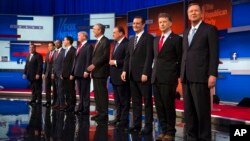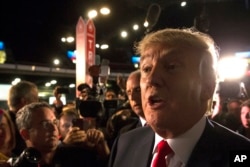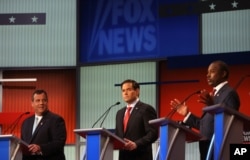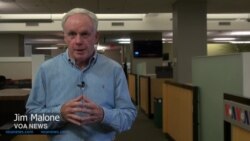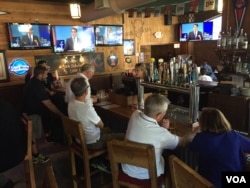Billionaire real estate businessman and television personality Donald Trump was center stage Thursday night as 10 leading Republican presidential candidates looked for a break-out moment at their first debate on the road to the November 2016 election.
The real estate mogul and nine others squared off in Cleveland, Ohio for the debate that gave Americans their first look at the major Republican candidates, six months before the first nominating contest in the Midwestern state of Iowa.
The outspoken candidate met expectations at the start of the debate. Asked if he would pledge to rule out a run as an independent if he does not win the Republican nomination, Trump declined. "I will not make the pledge at this time,'' he said.
The feisty Trump also refused to apologize when questioned about his past insulting comments about women, including calling them "fat pigs," "dogs" and slobs."
"The big problem this country has is being politically correct," Trump said. "I don't frankly have time for total political correctness. And to be honest with you, this country doesn't have time either."
Joining him on stage in the important election swing state of Ohio was a field of seasoned governors, rookie senators and a never-been-elected outsider, most of whom steered clear of directly targeting Trump, who is leading in many recent polls.
Bush: I'm proud of my brother
Former Florida Governor Jeb Bush, widely seen as a frontrunner and a favorite of establishment Republicans, acknowledged he must be able to differentiate himself from his brother, former President George W. Bush, and his father, ex-President George H.W. Bush.
"I'm going to have to earn this," Bush acknowledged. "Maybe the bar is even higher for me. That's fine. I've got a record in Florida. I'm proud of my dad, and I'm proud of my brother."
Highlighting one policy difference with his brother, Bush acknowledged the 2003 U.S. invasion of Iraq "was a mistake," even while blaming President Barack Obama for the subsequent rise of the Islamic State, or ISIS.
"Barack Obama became president and he abandoned Iraq," Bush said. "And when he left, ISIS was created by the void that we left, and that void now exists as a caliphate the size of Indiana."
Anti-ISIS campaign criticized
Obama's campaign against the Islamic State was the target of widespread criticism from the debaters, many of whom called for the U.S. to utilize combat troops to help defeat the radical extremist group.
But Senator Rand Paul, who has frequently called for less American military intervention overseas, said the U.S. must hesitate before it funds rebels who are fighting the Islamic State.
"ISIS rides around in a billion dollars worth of U.S. Humvees. It's a disgrace. We've got to stop. We shouldn't fund our enemies, for goodness' sakes," Paul said.
Paul, Christie clash over NSA surveillance
In one of the feistier exchanges of the night, Senator Paul clashed with New Jersey Governor Chris Christie over controversial NSA surveillance of Americans and foreigners.
"I want to collect more records from terrorists and less from regular Americans," said Paul, who is an outspoken critic of the NSA's bulk collection of American telephone records.
Governor Christie shot back, calling Paul's answer "completely ridiculous."
"You know senator, when you’re sitting in a sub-committee just blowing hot air about this, you can say things like that. When you’re responsible for protecting the lives of the American people, then what you need to do is to make sure that you use the system the way it’s supposed to work," Christie said.
The exchange was reflective of a widening gap within the Republican Party between those who favor more hawkish national security policies and those who prefer a more libertarian approach.
VOA's Jim Malone discusses the foreign policy aspects of the debate:
An enthusiastic crowd of 4,500 filled the arena, cheering on the candidates, which also included former Arkansas Governor Mike Huckabee, Ohio Governor John Kasich, Senators Marco Rubio and Ted Cruz, and retired neurosurgeon Ben Carson.
Candidates square off in 'happy hour debate'
Before the main event, seven Republican presidential candidates who rank lower in the polls took part in a separate debate and quickly challenged Trump's conservative credentials.
Former Texas Governor Rick Perry contrasted Trump’s tough talk on immigration control to his own record, in which he deployed the National Guard to stem the tide of illegal immigrants.
Former Hewlett-Packard CEO Carly Fiorina took a shot at Trump as well, saying his shifting positions on key issues make him untrustworthy.
Perry and Fiorina shared the stage with former governors George Pataki and Jim Gilmore, current Louisiana Governor Bobby Jindal, South Carolina Senator Lindsay Graham and former Pennsylvania Senator Rick Santorum.
Candidates target Hillary
Democratic frontrunner Hillary Rodham Clinton was the other favorite target in the pre-debate forum, especially when the moderators asked foreign policy questions. South Carolina Senator Graham urged Americans not to support the former first lady and secretary of state.
"To all the Americans who want a better life, don't vote for Hillary Clinton. You're not going to get it," Graham said.
The 10 who competed in the prime time debate on the Fox News Channel were chosen based on an aggregate of polls the network used to determine the field. Similar models are expected to be used for future Republican debates.
Trump headed into the late evening debate with a solid lead in the national polls. A Bloomberg survey released Tuesday had Trump at 21 percent, handing him a double-digit lead over the rest of the field.
First Democratic debate set for October
Democrats made some news of their own Thursday. In Washington, the Democratic National Committee announced plans for its presidential debates, the first of which is to be October 13 in Nevada. It said four debates are planned for early presidential primary states in advance of the Iowa caucuses, which begin February 1.




